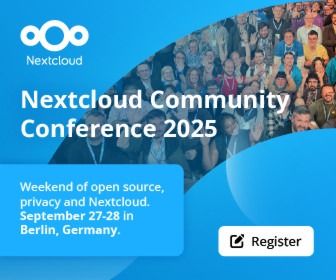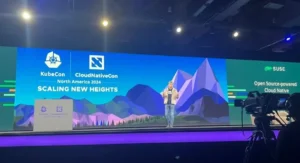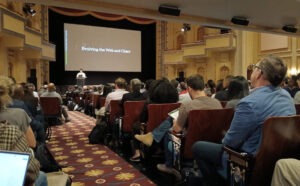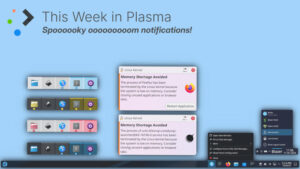Although it appears that after a 22-year run that linux.conf.au is now a thing of the past, the folks who brought it to you have launched a new conference that’s about… well, everything open.
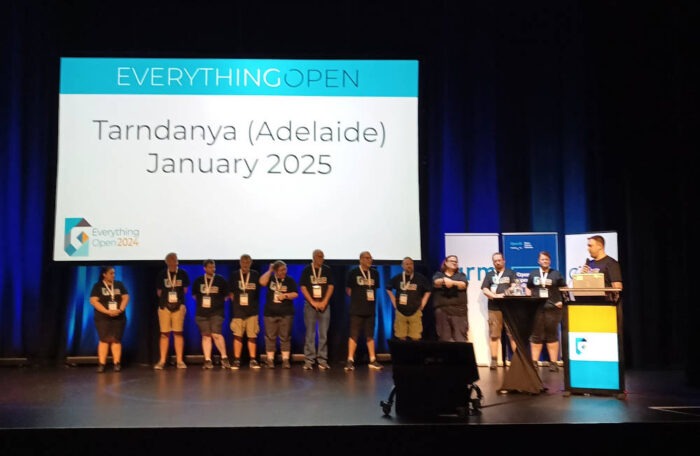
The bad news for open source jet-setters who regularly attend all of the big open source conferences no matter where on Earth they’re held is that Australia’s Linux.conf.au appears to be a thing of the past.
The good news, especially for those who live in the land down under, is that a new annual event, Everything Open, has arisen to pick up some of the slack. It’ll open its doors for a third three-day run on January 20 in the city of Adelaide. That means it’s already showing staying power… and they do say that the third time is the charm.
There are differences between this new conference and Linux.conf.au. For one thing, it’s a lot smaller — three days instead of five days — and it targets a smaller homegrown audience instead of courting the international set. In addition, it expands on the concept of “open” to include more than merely software.
It’s also not clear — even to the presenters — whether this is a replacement for Linux.conf.au, which isn’t officially dead yet, or something else. Somebody might yet pick up the baton and resurrect the older conference.
“Some people are saying that Everything Open has replaced Linux.conf.au,” Donna Benjamin, co-chair of Everything Open’s session selection committee told FOSS Force. “I’m not sure that’s true. I think if a team wanted to step up and run LCA, Linux Australia would support that, but no one has as of yet, so it remains to be seen as to whether or not Everything Open replaces LCA, or is an evolution in a different direction still leaving space for LCA.”
No matter how it goes, however, LCA will be a forever part of Everything Open’s roots.
Linux.conf.au in a Nutshell
To give it the full configuration filename treatment, LCA’s name when written out was generally spelled all lower case. Its last in-person outing was in January, 2020 just ahead of Covid and lockdown. After that, there were two virtual events and nothing since, mainly because nobody wanted to take on the gargantuan task of rebooting it.
“Prior to lockdown linux.conf.au had become huge,” Benjamin said. “It was a five-day conference, but it also had free events and post events. For a volunteer
team to run it, it had become quite an effort. We’d sort of said that it had become a two year organizing effort rather than one. What we found coming out of the pandemic and running it online is that no one was bidding to run it anymore. There just weren’t any bids.”
The conference had played a central role in Australia’s open-source community throughout the 21st century. It was an outgrowth of the Conference of Australian Linux Users, a one-off event held in Melbourne in 1999 that had been organized by Linux kernel developer and free software advocate Rusty Russell, and which featured Jon ‘maddog’ Hall as its keynote speaker.
Two years later, Linux Australia launched the first LCA in Sydney, which featured keynotes by Alan Cox, a kernel developer who’s history with Linux goes back to 1991; David Miller, another important kernel developer; and Andrew Tridgell, a native Aussie who among other things was the co-inventor of the rsync algorithm. Important and well-known keynoters became a hallmark of the conference. Linus Torvalds gave a keynote address there in 2015, but perhaps more famously agreed to be dunked to raise money for charity in 2004.
The event was also a road show, taking place in a different city each year. On three occasions during its 22-year run, organizers moved the event outside of Australia — to New Zeeland.
Everything Open
Like LCA, Everything Open is a movable feast. For its inaugural run in 2023 the event took place in Melbourne, Australia’s second-largest city, then moved to Gladstone, a small coastal city with a population of about 45,000 in the country’s northeastern state of Queensland, for its sophomore showing. This year the event will take place in Adelaide in South Australia.
Everything Open also has a mandate that is a little more inclusive than most open source conferences and Linux festivals, a difference that Benjamin said is reflected in the conference’s name.
“Everything Open and the communities around it,” she said. “Technology, community, the sharing of knowledge, and bringing people together who care about those things. So, open source software obviously, but just as importantly, open data, open education, open government… There’s a little bit of security focus in there, but it’s really that idea of open technology and the communities around it.”
Also covered is open hardware, as well as open GLAM, which is one that got me Googling. It turns out that GLAM is an acronym for galleries, libraries, archives, and museums, or any other cultural institutions with a mission to provide access to knowledge. How’s that for a conference that covers all things open?
The speakers scheduled for the event are mostly local folks who aren’t necessarily known outside of Australia. Benjamin said that this is partly due to a post pandemic realization that huge conferences with international attendees flying in from all corners of the world are not not really sustainable, and are definitely not good for the environment.
“I think there’s also an element of acknowledging that we do have homegrown talent,” she said. “We’re kind of getting over that cultural cringe that we need to have experts from overseas to teach us the wisdom from up north. We’re now acknowledging that we’ve actually got a lot of people locally who have great stories.”
Of course, concentrating on local talent also makes it easier to keep to a budget.
“We do have a few people coming from overseas, but one of the things, I guess, is that we had a very small travel budget,” she added. “To make that go as far as possible, we’d sort of give that to people who were coming from not so far away rather than spending it all on bringing someone over from the US or Europe.”
When, Where, and How
Everything Open 2025 will take place from Monday, January 20 to Wednesday, January 22 at the Adelaide Convention Centre, a venue in downtown Adelaide that overlooks the River Torrens which runs through the center of the city.
Although four sessions will always be taking place simultaneously, the sessions won’t be grouped together under track headings as is normal at most conferences. Instead, except for the tutorials that will be operating on their own schedule because they’re longer, sessions will be allocated space according to anticipated attendance.
“One of the things that we sort of inherited from Linux.conf.au is that the talks that the committee thinks are going to be the most popular all go in the biggest room,” Benjamin explained.
Although it appears that the keynotes aren’t completely set in stone yet, otherwise the schedule is available online. In addition, FOSS Force will keep posting updates between now and the event’s opening day on our Calendar of Open Source Events. Pricing and registration information is available here.
For those who can’t attend in person, the event will also be livestreamed, which also requires registration.
As something of a parting shot, I asked Benjamin what she was expecting for herself from this year’s event.
“I’m fully expecting to be kind of humbled and blown away, and puzzled and delighted, by the range of different things that are there,” she answered, “and of course, I should.”
Editor’s note: An earlier version of this article indicated that Linux Australia is no longer interested in funding a continuation of linux.conf.au, which appears not to be the case, although the future of the event is still uncertain.
Christine Hall has been a journalist since 1971. In 2001, she began writing a weekly consumer computer column and started covering Linux and FOSS in 2002 after making the switch to GNU/Linux. Follow her on Twitter: @BrideOfLinux


